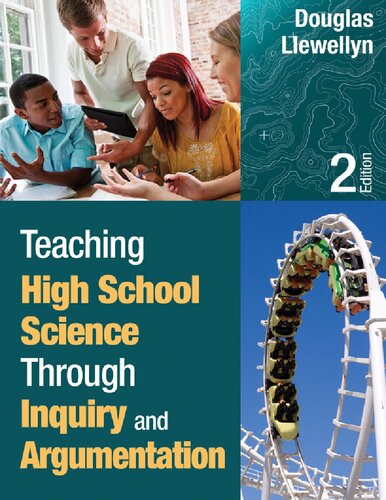

Most ebook files are in PDF format, so you can easily read them using various software such as Foxit Reader or directly on the Google Chrome browser.
Some ebook files are released by publishers in other formats such as .awz, .mobi, .epub, .fb2, etc. You may need to install specific software to read these formats on mobile/PC, such as Calibre.
Please read the tutorial at this link. https://ebooknice.com/page/post?id=faq
We offer FREE conversion to the popular formats you request; however, this may take some time. Therefore, right after payment, please email us, and we will try to provide the service as quickly as possible.
For some exceptional file formats or broken links (if any), please refrain from opening any disputes. Instead, email us first, and we will try to assist within a maximum of 6 hours.
EbookNice Team

Status:
Available0.0
0 reviews(Ebook) Teaching High School Science Through Inquiry and Argumentation 2nd Edition by Douglas J Llewellyn - Ebook PDF Instant Download/Delivery: 9781452244457 ,1452244456
Full download (Ebook) Teaching High School Science Through Inquiry and Argumentation 2nd Edition after payment

Product details:
ISBN 10: 1452244456
ISBN 13: 9781452244457
Author: Douglas J Llewellyn
(Ebook) Teaching High School Science Through Inquiry and Argumentation 2nd Edition Table of contents:
1. Constructing an Understanding of Inquiry
Three Designations of Inquiry
What the National Science Education Standards Say About Inquiry
What A Framework for K−12 Science Education and the Next Generation Science Standards Say About Inquiry
Inquiry as a Three-Legged Stool
Seven Segments of Scientific Inquiry
The Pretzel Theory of Science Inquiry
Inquiry as a Human Endeavor
Ten Beliefs (and Rebuttals) About Inquiry-Based Learning
What Science Inquiry Is—What Science Inquiry Isn’t
A Definition of Scientific Inquiry
Questions for Reflection and Discussion
2. Constructing an Understanding of Scientific Argumentation
The Influence of Media
What Is a Scientific Argument?
Parts of an Argument
Making a Case for Argumentation
What the National Science Education Standards Say About Argumentation
What the Common Core State Standards Say About Argumentation
What A Framework for K−12 Science Education and the Next Generation Science Standards Say About Argumentation
Different Types of Reasoning
Flaws in Scientific Reasoning
Scaffolding Argumentation in the Classroom
The Classroom as a Courtroom
Painting a Picture of What Real Scientists Do
Questions for Reflection and Discussion
3. Learning About Inquiry and Argumentation Through Case Studies
A Case Study Approach
A Case Study: Inquiring About Isopods
The Inquiry Cycle
Brainstorming
Questions for Reflection and Discussion
4. Choosing to Become an Inquiry-Based Teacher
A Choice in Teaching
Self-Directed Learning
The Top 10 Reasons Why Teachers Say They Can’t Teach Through Inquiry
Myths and Misconceptions About Inquiry-Based Teaching
What’s Your Instructional Pie?
Steps in Becoming an Inquiry-Based Teacher
Monitoring Your Progress
The Case of Angela Bicknell
Questions for Reflection and Discussion
5. Developing a Philosophy for Inquiry
What Is Constructivism?
Traditional Versus Constructivist Classrooms
Historical Perspectives of Constructivism
Constructivism Today
Metacognition
How Adolescents Learn
Misconceptions
Conceptual Change Theory
Making Sense of Language
The 5E Learning Cycle
Challenges to Creating a Constructivist Classroom
All Things Are Possible
Case Study: Investigating Yeast
Questions for Reflection and Discussion
6. Four Levels of Science Inquiry 100
Promoting Student Inquiries
Invitation to Inquiry
Demonstrated Inquiries
Structured Inquiries
Guided or Teacher-Initiated Inquiries
Self-Directed or Student-Initiated Inquiries
Guiding Students Into Inquiry
Differentiated Science Inquiry
Case Study 1: Bottle Ecosystems
Case Study 2: The Finger Lakes Regional Stream Monitoring Network
Questions for Reflection and Discussion
7. Modifying a Lab Activity Into an Inquiry-and Argument-Based Investigation
The Role of the Laboratory in Science
New Approaches to Traditional Labs
Modifying a Traditional Lab Into an Inquiry-Based Lab
Addressing Misconceptions About Density
Scaffolding Toward Inquiry
Writing an Inquiry/Argument-Based Lab Report
The Current Debate About High School Science Labs
Case Study: The Hydrate Lab
Questions for Reflection and Discussion
8. Managing the Inquiry-Based Classroom
The Implementation Curve
Challenges to Inquiry-Based Teaching
Making Time for Inquiry and Argumentation
Avoiding a Lockstep Approach
Establishing the Right Atmosphere
Assessing and Monitoring Your Classroom Management Strategies
Case Study: Investigating Contour Lines
Questions for Reflection and Discussion
9. Developing Effective Questioning Skills
The Purpose of Questions
Bloom’s Taxonomy
Expository Questions
Quality Questions Model Quality Thinking
Questioning Techniques
Just Tell Me the Answer
The Power of Praise and Positive Reinforcement
A Three-Step Approach to Better Questioning
Recalibrate Your Questioning Skills
Exploratory Questions
Case Study: Designing a Professional Development Plan
Questions for Reflection and Discussion
10. Assessing Scientific Inquiry
The Anxiety Over Assessment
Curriculum Alignment
Formative and Summative Assessment Tools
Designing Assessments
Choosing the Right Test Item
Using Multiple Assessments
Authentic Assessments
Transitioning to New Assessments
Case Study: Measuring and Assessing Centripetal Force
Questions for Reflection and Discussion
11. Creating a Classroom Culture of Inquiry and Argumentation
The Environment of a Traditional Classroom
The Environment of an Inquiry-Based Classroom
Students in an Inquiry-Based Classroom
Teachers in an Inquiry-Based Classroom
A Classroom Culture That Fosters Inquiry and Argumentation
Reflecting on a Teaching Career
Final Thoughts: Your Legacy
Questions for Reflection and Discussion
Resource A: Resources for High School Science Teachers
Print Resources on Scientific Inquiry and Argumentation
Print Resources on Inquiry-and Argument-Based Investigations
Print Resources on Constructivism
Print Resources on Science Standards and Science Literacy
Print Resources on Assessment
Print Resources on General Science Areas
Multimedia Resources on Scientific Inquiry and Argumentation
Online Resources on Scientific Inquiry and Argumentation
Professional Organizations
Resource B: Bottle Handout
References
Index
People also search for (Ebook) Teaching High School Science Through Inquiry and Argumentation 2nd Edition:
science inquiry in the elementary classroom
scientific inquiry 6th grade
scientific inquiry activities high school
5 inquiry questions
4th grade science inquiry lessons
Tags: Douglas J Llewellyn, High School Science, Argumentation